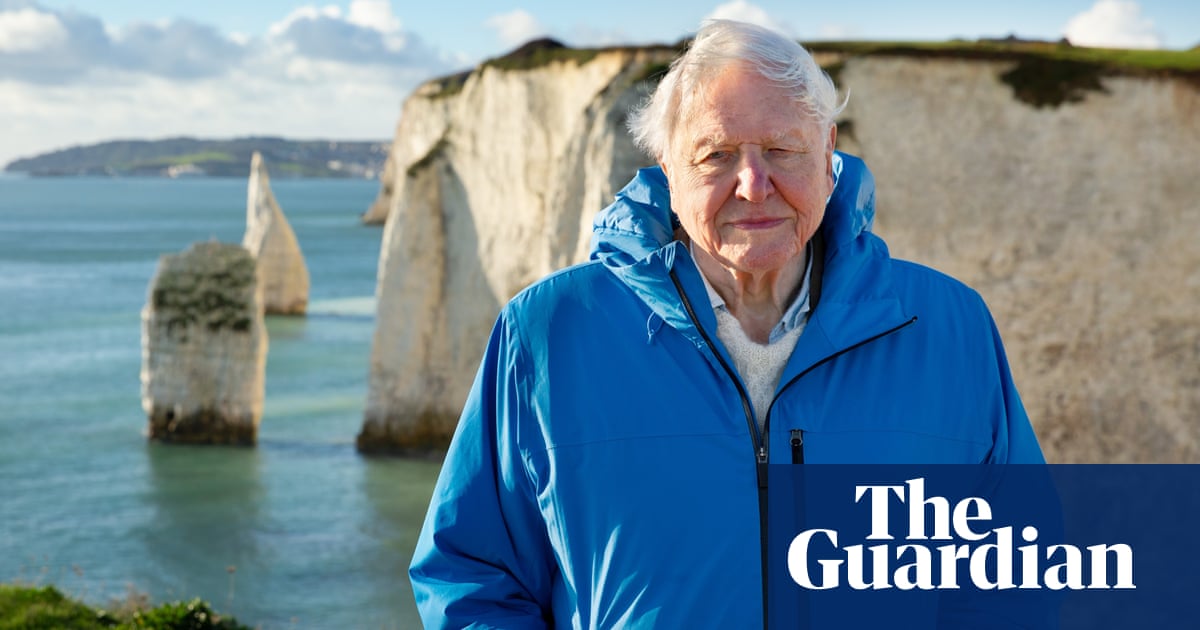When David Attenborough’sBlue Planet IIdocumentaryaired eight years ago, its impact was so strong it was credited withbringing about a revolutionin the way people use plastics. Now film-makers are hoping he can do the same for other destructive environmental practices that the world’s best-known living naturalist describes as “draining the life from our oceans”.
The industrialfishing method of bottom trawlingis the focus of a large part of Attenborough’s latest film, Ocean, which airs in cinemas from 8 May, the naturalist’s 99th birthday. In a remarkably no-holds-barred narrative, he says these vessels tear the seabed with such force “the trails of destruction can be seen from space”. He also condemns what he calls “modern day colonialism at sea”, where huge trawlers, operating off the coasts of countries reliant on fish for food and livelihoods, are blamed for dwindling local catches.
Industrial fishing, he says, has killed “two-thirds of all large predator fish”. In Antarctica, trawlers may be “removing the foundation of an entire ecosystem”.
Sharks and turtles that survived the extinction of the dinosaurs, he says, may not survive hundreds of thousands of industrial trawling vessels, which compete with marine life and coastal fishing communities in “every corner of the ocean”.
In railing against such widespread fishing practices, Attenborough has “gone a lot further” than he has before, says Keith Scholey, one of the film’s directors and co-founder of Silverback Films, who has worked with Attenborough for more than 40 years.
“He’s come to a new place. He knows how much the public trusts him and how careful he has to be. He does want to bring about this change. So he absolutely has gone a lot further with this than before.
“He is very sure that this is an opportunity for the world.”
The film’s most dramatic scenes include world-first footage showing bottom trawlers, including a scallop dredger off the south coast of Britain and another in Turkey. Clouds ofcarbon-capturing sediment are churned up, and fish and other marine life leap in vain to escape heavy beams smashing their way across the sea bed, destroying everything in their path.
“The idea of bulldozing a rainforest causes outrage, yet we do the same underwater every day,” says Attenborough. “Surely you would argue it must be illegal.”
Attenborough hasfaced some criticism in the pastfor not going far enough with his messaging around the climate crisis. His response has been that repeated warnings about human destruction of the natural worldcan be a “turn-off”for viewers and his role was not to campaign but to tell “gripping and truthful” wildlife stories.
Scholey says Attenborough’s role as a storyteller, rather than campaigner, has helped people understand the natural world.
“What David has succeeded at doing is remaining trusted by everyone, so that when he plays his cards, he can affect things in a huge way.”
As he approaches 100 years on the planet, Attenborough tells viewers of the film, two years in the making, that it is the seas that cover more than 70% of our planet that should be the focus of our concern: “I now understand that the most important place on Earth is not on land but at sea,” he says. “We are at a crossroads, with humanity draining the life from the ocean.”
The documentary’s mission, says Scholey, is to highlight the UN’s upcoming Ocean Conference in Nice, in June, where it is hoped a plan for ocean protection can be reached. Member states have agreed in principle to protect 30% of the world’s oceans from destructive fishing by 2030,as part of an agreementto stop biodiversity loss. Attenborough’s message is that this target needs more action.
Sign up toGlobal Dispatch
Get a different world view with a roundup of the best news, features and pictures, curated by our global development team
after newsletter promotion
Scholey compares the rise of industrial fishing with commercial whaling, both of which have driven species “to the point of collapse”.
Amid the anti-whaling protests of the 1970s and 80s, it was thought whale populations, some hunted to the brink of extinction, might never recover. But an agreement by the International Whaling Commission in 1982 stopped commercial whaling, and speciesare now thriving.
“Success is possible,” Attenborough attests from the deck of a vessel, as a blue whale swims alongside. “I’ve seen it on a global scale once before.”
Toby Nowlan, one of Ocean’s three directors, who also produced it, says: “There is an element of wake-up call, but really it’s a story of hope and recovery.”
The film shows inspirational stories of ocean recovery in places where destructive fishing is banned, including off the Isle of Arran, Scotland, and Papahānaumokuākea Marine National Monument, Hawaii.
“The ocean can recover faster than we can ever imagine: it can bounce back to life,” says Attenborough.
Ocean will be available on Hulu and Disney+ later this year
